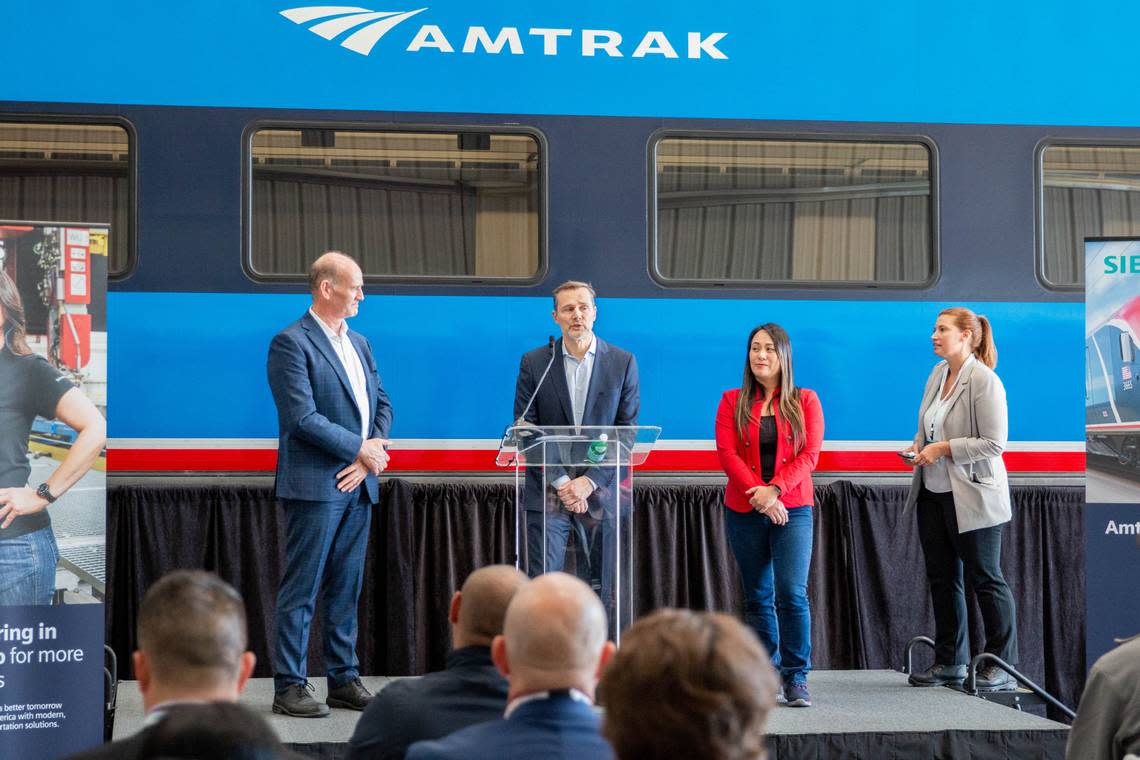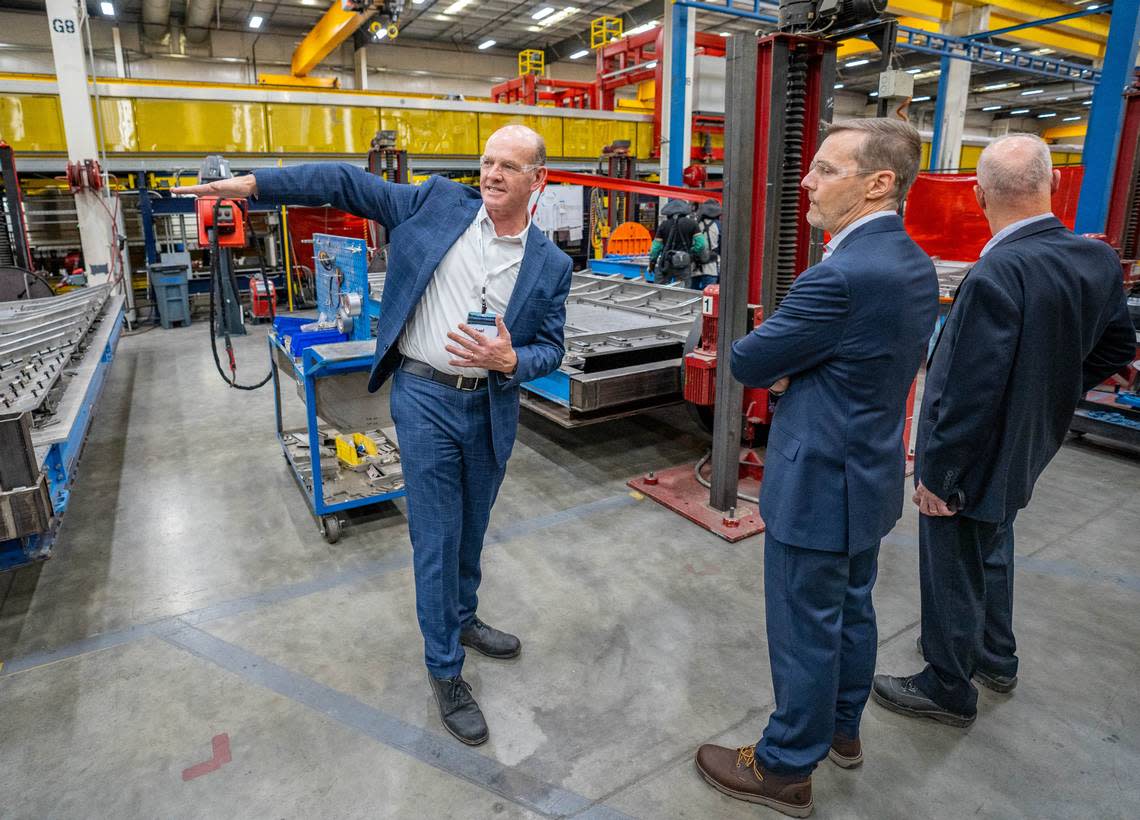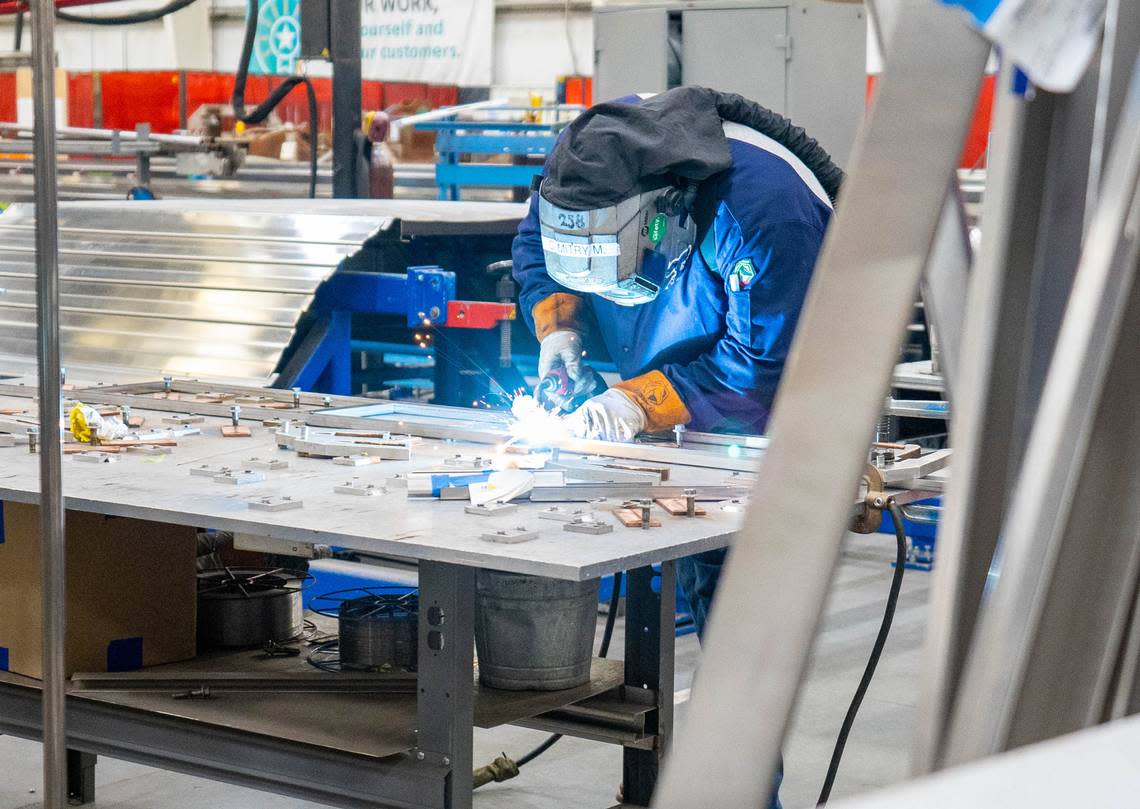Sacramento’s Siemens train facility has an Amtrak contract. Here’s what they are building
The unveiling of the shiny blue Amtrak passenger coach caused employees at the Siemens Mobility plant in Sacramento Wednesday afternoon to hug each other, take pictures with co-workers and feel good about the moment.
Dozens of the workers present had been involved in the construction of the first Amtrak Airo car. Five hundred seventy-seven of these cars are expected to be produced at the facility over the next several years. Shipments of the cars to Amtrak should begin by the end of 2024.
The $4.9 billion Amtrak contract with Siemens Mobility Inc. is the largest in the company’s history. All the construction is being constructed in Sacramento, at the 2,500 worker facility, which spans 60 acres and contains dozens of buildings.
Siemens Mobility is a subsidiary of Siemens AG, the German manufacturing conglomerate based in Munich.
“We’ve been working with Amtraksince 2010,” said Michael Cahill, Siemens Mobility President of Rolling Stock North America,as the train car was unveiled at a press event in a big warehouse building. “This is a prototype to make sure what we design is buildable.”
The train car was indeed real, Cahill pointed out. But it seemed like part of a Hollywood prop because there were no seats inside. They were still being designed.
Cahill said the car would serve as a guide to making sure design flaws were found and future cars were constructed smoothly.
Roger Harris, president of federally chartered Amtrak, said the train car looked “ better in person than in paper.”

And in what could be a good sign for Siemens, Harris said Amtrak officials were in discussion about purchasing more train sets for more markets across the country.
Harris put in a plug for President Joe Biden’s infrastructure bill, which allocated $44 billion for Amtrak in late 2021.
He said the new train cars, purchased with the funds from the infrastructure bill, will “bring more frequent service and expand the appeal of rail service.”
The current order with Amtrak extends through 2030. The first new trains should start operating on Amtrak train routes in 2026. They will replace aging Amtrak train coaches that are 40-50 years old.
Harris said the trains will have panoramic windows and more comfortable seating with movable headrests and seat-back tablet holders. He said trains also will have a redesigned cafe car and come with individual power outlets, USB ports, onboard WiFi, and better lighting.
He said the first new trains would be put on the Amtrak Cascades Route, which offers service between Eugene, Oregon and Vancouver, British Columbia.
Harris said that would be followed by Amtrak’sNortheast regional routes.
Job creation is emphasized nationwide.
Siemens officials say they have added 299 employees to the Sacramento facility in the past year. Cahill Wednesday said he expected the current worker total of 2,500 at Sacramento would continue to grow.
But Amtrak President Harris emphasized a American-manufactured . supply chain that will create jobs outside of Sacramento.
Federal funding for railroad projects requires all components to be purchased in the U.S.
Harris said that 3,000 parts are being made for the trains by 100 suppliers in 31 states.

Siemens is planning a second major major transit manufacturing facility in North Carolina. It’s unclear what affect it will have on Sacramento.
Siemens broke ground on the $220 million rail car production facility in Lexington, North Carolina in August.
Siemens officials have said they anticipate hiring 500 workers for the Lexington facility by 2028.
At Wednesday’ news event, Cahill explained that the construction of the North Carolina facility was to “get closer to our customers on the east coast.”
But he quickly referenced the Sacramento facility adding, “just to be sure, this isn’t going anywhere.”
The Sacramento Siemens facility has been in operation for more than 30 years, starting out with just 34 employees, Cahill noted.
Siemens Mobility Receives New Contracts
The Sacramento facility seemed like a Disneylandof trains on Wednesday. Red San Diego Trolleys were lined up inside one inspection facility and white cars for the South Transit light rail in the Seattle area were lined up on other outside tracks.
In one construction facility, welders used blowtorches and hammers to construct the new Amtrak cars, spark by spark, piece by piece. Some cars were partially completed, others were in their final stages.
On Oct. 9, Siemens announced more good news: It had signed a $45 million contract with the Sacramento Regional Transit Districtfor eight additional light rail vehicles. The vehicles will be low floor, meaning that disabled passengers can enter the cars at any of the train doors.
The order builds upon an initial order of 20 cars in 2020 and another eight in 2021.

Siemens Mobility is also a potential supplier of high speed trains for the California High-Speed Rail Authority.
Siemens was one of three companies that sat in a pre-bid online conference with the authority earlier this year.
The rail authority has an estimated budget of about $561 million for a contract to buy six train sets and 30 years of maintenance. The authority hopes to begin carrying passengers by 2030 on its initial operating segment between Merced and Bakersfield.
Siemens is also one of two bidders for construction of Brightline West, a privately funded rail line that wants to build high speed rail lines between Southern Californiaand Las Vegas.
Siemens had provided the trains for Brighline’s East Coast service between Orlando and Miami, which began last month.
